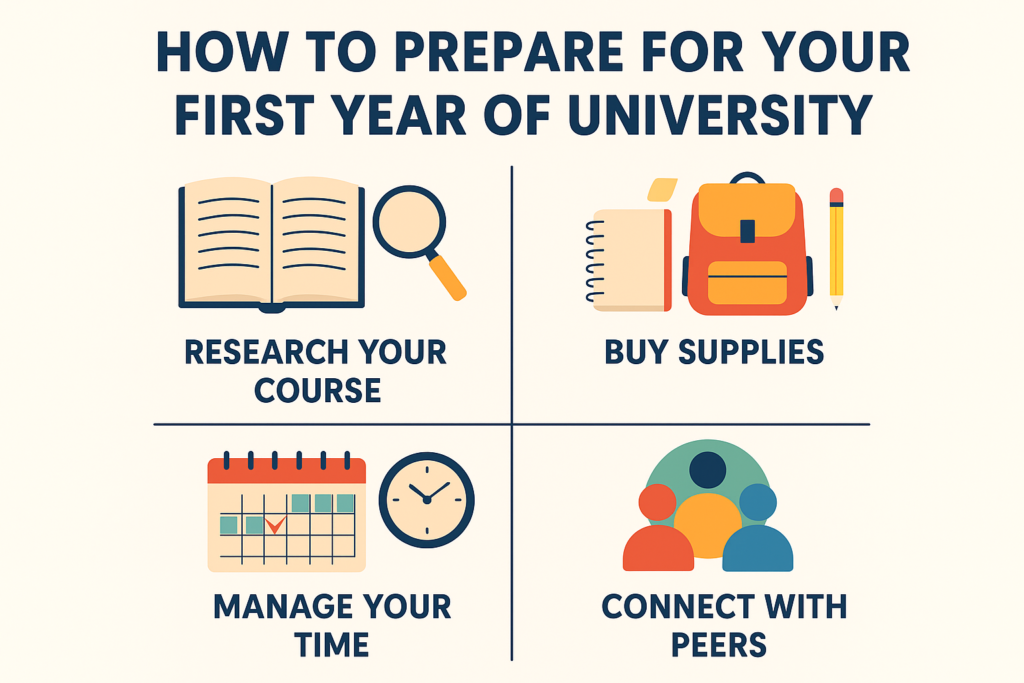How to Prepare for Your First Year of University
Starting university can feel like a big step. You might be excited, nervous, or unsure of what to expect. That’s normal. The first year is full of changes—new people, new places, and a new way of learning.
This guide will help you prepare for your first year of university straightforwardly and honestly, without complicated advice. Whether you’re an international student, moving out for the first time, or commuting from home, these tips will make your start smoother.

1. Know What University Life Looks Like
At university, you’ll have more independence than in school. Your classes won’t take up the whole day, but that doesn’t mean there’s less work. You’ll be expected to read, research, and study on your own.
Before classes begin, check your subject outlines. These documents tell you:
-
What topics you cover
-
When assignments are due
-
What your exams will be like
Reading this early helps you plan, so you’re not caught off guard.
2. Organise Your Living Arrangements
If you’re moving away from home, it’s important to sort out where you’ll live. There are usually a few options:
-
On-campus housing – close to classes, easy to meet people
-
Student apartments or shared flats – more freedom, may be cheaper
-
Living with family or relatives – saves money, but may involve travel
-
Homestays – ideal for international students who want a home-style environment
Make sure wherever you stay is safe, has good transport access, and allows you to study comfortably.
3. Learn How to Budget
Many students get their first real taste of money management in uni. It’s a good idea to track your spending and understand your regular costs. Things to include:
-
Rent or accommodation
-
Food and groceries
-
Public transport
-
Course materials
-
Phone and internet bills
-
Social events or eating out
Some students take up part-time jobs, but even with casual work, budgeting is important.
4. Get Basic Study Supplies
You don’t need to spend too much on stationery or gear. Start with the essentials:
-
A laptop or tablet that runs well
-
Notebooks or folders for each class
-
Pens, highlighters, and sticky notes
-
Access to Word or Google Docs
Your uni will likely use an online system for classes. Find out what that is (like Moodle, Blackboard, or Canvas) and get familiar with it before the semester starts.
5. Go to Orientation
Orientation Week (often called O-Week) is more useful than most people think. It’s not just about free stuff and campus tours—it gives you a proper look at how things work:
-
Where are your lecture halls?
-
How to use the library
-
What clubs can you join
-
Who to ask if you need help
You’ll also meet other new students who are figuring things out, just like you. Even chatting with a few people during this week can help you feel less alone later.
6. Create a Weekly Routine
Uni life doesn’t have a strict schedule like school. You might only have four or five classes a week, but that doesn’t mean less work. In fact, a lot of the learning happens outside the classroom.
To avoid falling behind:
-
Keep track of assignment dates
-
Set aside time each week to review lectures
-
Don’t wait until the last minute to study
-
Take breaks but stick to your study hours
Apps like Google Calendar or even a simple planner can help you stay organised.
7. Look After Yourself
Your first year can feel overwhelming at times. That’s why it’s important to take care of both your body and your mind. Some things that help:
-
Eat proper meals—not just instant noodles
-
Get some fresh air or walk around each day
-
Don’t skip sleep to cram for tests
-
Reach out to someone if you’re feeling low
Most universities have free counselling and health services. They’re there for you, even if you just need someone to talk to.
8. Ask for Help When You Need It
No one expects you to know everything from day one. If you’re confused about a subject, unsure how to write an essay, or don’t understand an assignment, ask someone.
-
Email your lecturer or tutor
-
Go to academic help sessions
-
Visit the library or the study support team
You can also use trusted services like OnlineAssignmentsHelp.com for extra support with assignments, editing, or understanding study topics. It’s okay to need help—what matters is that you seek it early.
9. Make Time for Social Life
Studying is important, but so is making friends and having a life outside of class. Join a club, attend events, or volunteer. University isn’t just about books—it’s also about growing as a person.
Meeting new people can help you:
-
Feel more connected
-
Stay motivated
-
Learn about other cultures or ideas
-
Create friendships that last beyond uni
Even if you’re shy, just starting a small conversation with someone in your tutorial can go a long way.
10. Don’t Put Pressure on Yourself
Your first year is a time to adjust. Some subjects may feel hard. Some weeks may feel messy. That’s all part of the learning process.
You don’t need to be perfect. What matters is trying your best, showing up to class, and asking questions when you don’t understand something.
Everyone struggles at some point. You’re not behind—you’re learning.
Final Thoughts
Your first year of university doesn’t need to be scary. With a bit of preparation and a steady mindset, you can make it a rewarding and positive experience. You’ll learn how to study independently, manage your time, and look after yourself.
Start by taking small steps: attend orientation, organise your space, and talk to others. Don’t be afraid to ask questions or try new things.
And if you ever need help—whether with a tricky assignment or just staying on track—support is always available.



